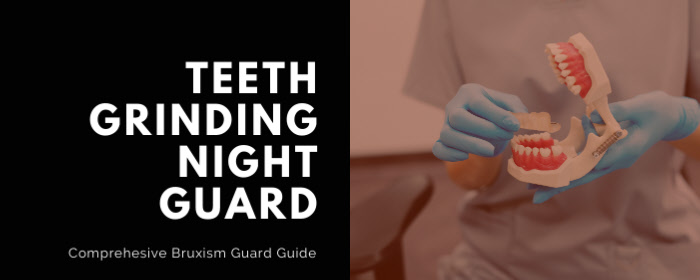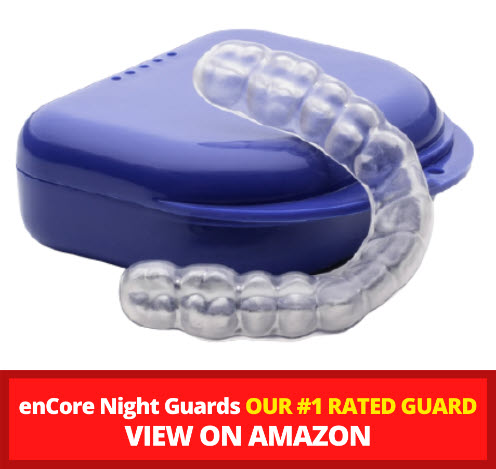
If you’re one of the many people who find themselves with bruxism or teeth grinding, then you may be interested in getting a night guard. People who grind their teeth at night often find that they have improved sleep and symptoms after wearing a tooth guard. Some people who suffer from bruxism find that they wake up with headaches and jaw soreness.
Occasional teeth grinding may not cause any significant problems. However, long term teeth grinding indicates that a mouth guard is probably in your best interests. The exact cause of teeth grinding is not known but your dentist may recommend a night guard.
Teeth Grinding Mouth Guards
In general, most cases of bruxism can be resolved by wearing this type of protection while you sleep. Night guards are exactly what their name suggests. They may also be referred to as mouth guards, bite splints, or dental guards. They protect your teeth by putting a barrier between your teeth. When you clench your jaw at night, the night guard will help to lighten the tension and give your mouth a cushion to reduce the pressure on your teeth. This not only helps to reduce pain and discomfort but also will protect the structure of your teeth. They may appear similar to snoring remedies.
Depending on the type and severity of your bruxism, you may need a prescription for a night guard. A dentists office can make one for you, but you can also purchase them over the counter. Night guards are fairly inexpensive when purchased from a store. Some people start with a normal mouth guard and, if not effective, will move to a prescription option.
Keep in mind that not all mouth guards are created the same. Your dentists office may recommend a certain type for you. However, if you’re not sure which option to choose, these are the primary ones available. To get an idea of which one may be best for you, these are the options available as well as the pros and cons of each kind.
Types of Night Guards
1. Soft Night Guard
This is the most common type of night guard that you’ll find in stores. It’s used for people who are mild and occasional teeth grinders and may not be appropriate for those who may be more severe teeth grinders. The benefits of this night guard is that it is comfortable and most people are able to wear it without any complications. It’s also adaptable and can fit a variety of oral shapes. The cost is also fairly low so you can trial this type of guard without spending much on it.
The downside to a soft night guard is that some people may still clench on the guard or unintentionally chew the softer material at night. They tend to be less durable than other options so will need to be replaced. Most warranties for this type of night guard will be only six months so you should prepare to purchase a new one at least twice a year. Finally, this type of night guard is not a long-term solution so it may not be effective for chronic teeth grinders.
2. Dual Laminate Night Guards
This is a type of mouth guard that is designed for people who find that they grind their teeth severely at night. They are softer on the inside and harder on the outside. This design is to make them more comfortable to wear while also offering adequate protection. They are a much stronger material and can withstand heavy clenching and grinding more than other mouth guards. They may also come with a longer warranty and will need to be replaced only occasionally.
The downside is that dual laminate guards tend to be thicker than other guards. People who are sensitive to having guards in their mouth may find that they tend to be too thick for comfort and have difficulty wearing them. Getting used to this type of guard may be challenging so they’re often not people’s first choice although they are effective.
3. Hard Night Guard
A hard night guard is made from acrylic and is both rigid and durable. They are designed for the more severe cases of teeth grinding as well as TMJ. As the most durable option, this is often desirable for people who have failed with other mouth guards. They also prevent the teeth from shifting which may be beneficial. Finally, they do offer the longest warranty so you should rarely if ever need to replace this type of guard.
The downside to the hard guard is that they are fairly thick and tend to be more uncomfortable than others. They generally are more difficult to getting used to sleeping with. This type of guard also has to be ordered through a dentists office since the makers will need an accurate impression for the guard to fit correctly. The hard type will also be more expensive than others, although insurance may cover some of the costs.
Adjusting to a Night Guard
If you’re struggling to get used to wearing a bruxism guard, then there are some things that you can do to help your body adjust. Start with the thinnest possible guard that’s suitable for you. Even if you have to get a different guard, you’ll probably be more used to it over time. Stick with the guard for at least four weeks and make it a habit to wear it every night. Even if you take it out throughout the evening, your body will be more used to wearing the guard. It will eventually become a part of your routine and you’ll find that it’s easier and more comfortable to put it in. Finally, it’s best to use the guard right before you go to sleep. Don’t wear it in the evening but wait until you’re actually trying to sleep. Otherwise, it will feel obnoxious.
With these tips, you’re well on your way to getting a mouth guard that will suit your mouth and help prevent overnight teeth grinding.


